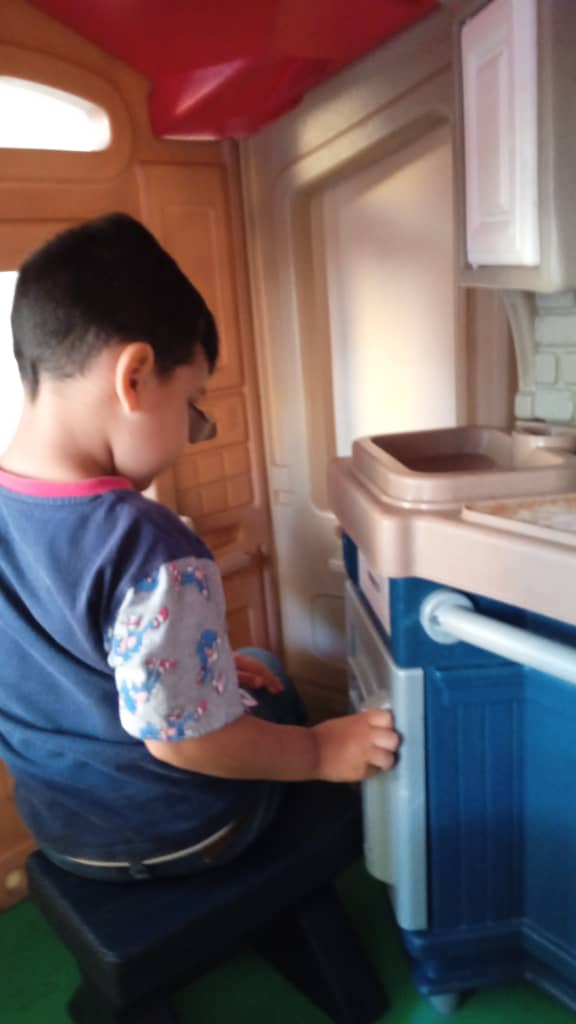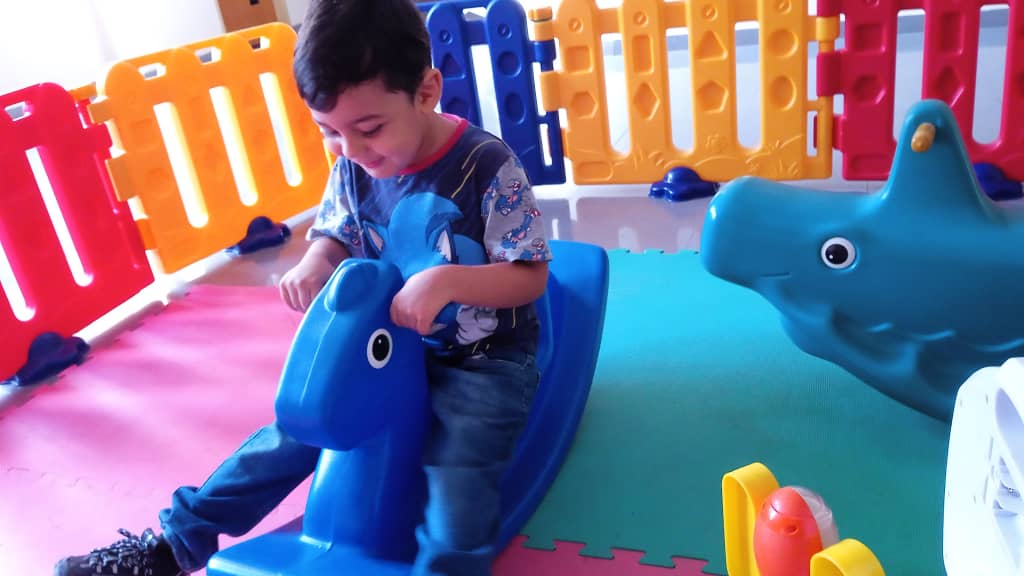
Desde noviembre del año pasado, nuestro pequeño Matthias ha luchado contra un estreñimiento crónico que afectó no solo su salud, sino toda nuestra dinámica familiar. Lo más frustrante era escuchar: "Es adaptación a la escuela, ya pasará", cuando claramente el problema persistía mes tras mes.
Estreñimiento + Resistencia al Baño Escolar
Días atrás les comenté de algunas dinámicas en casa que habían cambiado nuestras vidas. Hoy quiero contarte como hemos encaminado la situación, esperando llegar a feliz término. Mathias siempre tuvo un ritmo intestinal muy puntual, entre 10:00 am y 11:00 am era su hora de ir al baño. Pero al entrar a la escuela, se negaba rotundamente a usar el baño del colegio. Sus razones:
Está sucio
Los zancudos me pican
Me siento solo, me da miedo
El resultado; si iba a la escuela no iba al baño en su horario, simplemente no hacía. Y así comenzó un círculo vicioso de retención, heces duras y dolor al evacuar.
La Pediatra Decía que Era "Adaptación" Pero Nunca Mejoró
Mes tras mes, la pediatra nos insistía: "Es normal, se acostumbrará". Pero terminó el año escolar y Mathias nunca se adaptó. Desde noviembre hasta marzo lo tuve que desparasitar 4 veces por indicaciones de los médicos de Seguro Social, inclusive tuvo amibicis, tratamiento que duro 21 días con dos antibióticos. Ya que, aunque no aparecían parásitos en los resultados de heces, el doctor indico que había huevos y larvas. Por lo cual fue necesario un tratamiento por 21 días. Me llamaba la atención que mientras Mathias recibe tratamiento de antibióticos, iba al baño con regularidad todos los días.

Esto fue, afuera del consultorio de la gastroenteróloga pediátrica. Él feliz jugando en un espacio para niños que había allí.
Cabe destacar que mathias siempre está activo, brincando, bailando, pidiendo más comida. Solo en noviembre manifestó dolor, de resto solo la diarrea que aparece, nunca fiebre ni dolor. Pero para nosotros la situación de incertidumbre se volvió tan crítica que llegué a considerar renunciar a mi trabajo como maestra para estar en casa y ayudarlo con su rutina de baño.
En un post anterior, les conté que un directivo de la escuela me recomendó acudir a la Fundación del Niño, donde ofrecen servicios de psicología y pediatría sin costo. Gracias a ese consejo, logramos conseguir esta consulta con la gastroenteróloga pediátrica que tanto necesitábamos. Claro, esta consulta con la Gastro pediátrica si tuvo un costo de 70$ porque era en una clínica.
Lo que Aprendimos en la Consulta
Después de meses de probar remedios caseros como: aceite de oliva en ayunas, masajes en la barriguita y sus piernas, sopas en forma de crema; descubrimos que algunos alimentos empeoraban el problema.
Alimentos que NO Debes Darle a un Niño Estreñido
Al responder a la doctora lo que Mathais comía, me dijo, eso es lo que se cree pero no es así. Es que Mathias come mucho cambur, zanahoria, cremas de apio con zanahoria y apio, algunas galleticas y cosas saludables.
Entonces dijo algo que me sorprendió: Cambur y plátano amarillo le da más estreñimiento; solo el cambur muy maduro (casi negro) ayuda. El cambur normal y amarillo bonito endurece las heces.
Zanahoria y apio: Aunque son comunes en sopas, son astringentes y secan el intestino.
Alimentos que SÍ Funcionan:
- Frutas con fibra: piña, patilla, lechosa, durazno, ciruela pasa, kiwi.
- Verduras cocidas; espinaca, calabacín.
- Avena y cereales integrales.

El Tratamiento que Nos Dio la Especialista
Medicamentos Recetados
1. Milax: Laxante suave para ablandar las heces, una vez al día.
2. Probiotal: Probiótico para restaurar su flora intestinal.
Cambios en la Dieta
- Disminuir el consumo de: arepas, pan, zanahoria, apio y cambur no maduro.
- Aumentar fibra y líquidos.
Rutina de Baño Obligatoria
Sentarlo en el baño 10 minutos después de cada comida (aunque no tenga ganas). Esto ayuda a reentrenar su intestino.
Próximos Exámenes
Perfil 20 (análisis de sangre completo)
Eco abdominal (su último fue en noviembre 2022)
¿Qué Sigue Ahora? La doctora fue muy clara:
"Con este tratamiento, en un mes Mathias debería mejorar notablemente". Aseguro que ya solo debería quedar con alimentos integrados.
¡Por fin tenemos un camino claro!
Si tu hijo también sufre de estreñimiento persistente, te recomiendo:
1. No normalizar el problema (si lleva meses, busca un gastro pediatra).
2. Registra su dieta y hábitos (nosotros descubrimos los errores así).
3. Considera apoyo psicológico (en nuestro caso, la resistencia al baño escolar también requerirá terapia).
Aunque no me quedo muy claro las porciones de alimentos, me dijo claramente, no es dieta, no hay que llevarlo con un nutricionista, no hay que quitarle cosas, el esta con buen peso y saludable. Solo de lo que te indique vas a regular 2 veces por semana algunas cosas que veas que le pueden dar estreñimiento o combinar alimentos.
Hoy tengo todo más claro, llegué a pensar que renunciar a mi trabajo era la única solución. Hoy sé que buscar ayuda especializada a tiempo marca la diferencia.
¿Tu hijo también ha luchado con el estreñimiento? ¿Has tenido problemas con el rechazo al baño escolar?
Gracias por llegar hasta el final y leerme. Todos los niños son diferentes. Solo deseo compartir mi experiencia.
Todas las imágenes son de mi propiedad, tomadas con mi Redmi10A. Editadas en canva.
English Version

Since November of last year, our little Matthias has struggled with chronic constipation, which affected not only his health but our entire family dynamic. The most frustrating thing was hearing, "It's just getting used to school, it'll pass," when clearly the problem persisted month after month.
Constipation + Bathroom Resistance at School
A few days ago, I told you about some routines at home that had changed our lives. Today I want to tell you how we've addressed the situation, hoping to reach a happy ending. Mathias always had a very punctual bowel movement; between 10:00 a.m. and 11:00 a.m. was his bathroom time. But when he started school, he flatly refused to use the school bathroom. His reasons:
It's dirty
Mosquitoes bite me
I feel alone, it scares me
The result: if he went to school, he didn't go to the bathroom on schedule; he simply didn't go. And so began a vicious cycle of retention, hard stools, and painful bowel movements.
The Pediatrician Said It Was "Adapting" But He Never Got Better
Month after month, the pediatrician insisted: "It's normal, he'll get used to it." But the school year ended, and Mathias never adjusted. From November to March, I had to deworm him four times on the advice of the Social Security doctors. He even had amebiasis, a treatment that lasted 21 days with two antibiotics. Although no parasites appeared in the stool results, the doctor indicated that there were eggs and larvae. Therefore, a 21-day treatment was necessary. It caught my attention that while Mathias was receiving antibiotics, he went to the bathroom regularly every day.

This was outside the pediatric gastroenterologist's office. He was happily playing in a children's play area there
It's worth noting that Mathias is always active, jumping, dancing, and asking for more food. Only in November did he show any pain; otherwise, only the diarrhea that occurs, never fever or pain. But for us, the uncertainty became so critical that I considered quitting my job as a teacher to be home and help him with his bathing routine.
In a previous post, I told you that a school official recommended I go to the Children's Foundation, where they offer free psychology and pediatric services. Thanks to that advice, we were able to get the much-needed appointment with the pediatric gastroenterologist. Of course, this appointment with the pediatric gastroenterologist did cost $70 because it was in a clinic.
What We Learned at the Consultation
After months of trying home remedies such as olive oil on an empty stomach, tummy and leg massages, and creamy soups, we discovered that some foods made the problem worse.
Foods You Should NOT Give to a Constipated Child
When I asked the doctor what Mathais was eating, she told me, "That's what you think, but it's not true." Mathias eats a lot of bananas, carrots, celery soups with carrots and celery, some crackers, and other healthy foods.
Then she said something that surprised me: Bananas and yellow plantains make him more constipated; only very ripe (almost black) bananas help. Regular and nice yellow bananas harden stools.
Carrots and celery: Although common in soups, they are astringent and dry out the bowel.
Foods That DO Work:
- Fruits with fiber: pineapple, watermelon, papaya, peach, prune, kiwi.
- Cooked vegetables: spinach, zucchini.
- Oats and whole grains.
The Treatment the Specialist Gave Us

Prescription Medications
1. Milax: Mild laxative to soften stools, once a day.
2. Probiotic: Probiotic to restore his intestinal flora.
Dietary Changes
- Reduce consumption of: arepas, bread, carrots, celery, and unripe bananas.
- Increase fiber and fluids.
Mandatory Bathroom Routine
Sit him on the bathroom floor for 10 minutes after each meal (even if he doesn't feel like it). This helps retrain his bowel.
Upcoming Tests
Profile 20 (complete blood work)
Abdominal ultrasound (his last one was in November 2022)
What's Next? The doctor was very clear:
"With this treatment, Mathias should improve noticeably in a month." She assured him that he should only be eating whole foods.
We finally have a clear path!
If your child also suffers from persistent constipation, I recommend:
1. Don't normalize the problem (if it's been going on for months, see a pediatric gastroenterologist).
2. Record their diet and habits (we catch mistakes this way).
3. Consider psychological support (in our case, resistance to toilet training will also require therapy).
Although I wasn't entirely clear about the food portions, he told me clearly, it's not a diet, there's no need to take him to a nutritionist, there's no need to cut things out, he's at a good weight and healthy. Based on what he tells you, you'll limit yourself to twice a week, some things that might cause constipation, or combine foods.
Today everything is clearer to me. I once thought quitting my job was the only solution. Today I know that seeking specialized help early makes a difference.
Has your son also struggled with constipation? Have you had problems with bathroom refusal at school?
Thank you for reading this post. All children are different. I just want to share my experience.
All images are my own, taken with my Redmi 10A. Edited in Canva.